This study is on the Polish film director Andrzej Wajda s war trilogy Generation(1955), Kanal(1957), and Ashes and Diamonds(1958). These films are valuable both in historical and cinematic terms. Wajda has criticized Polish history through these films...
http://chineseinput.net/에서 pinyin(병음)방식으로 중국어를 변환할 수 있습니다.
변환된 중국어를 복사하여 사용하시면 됩니다.
- 中文 을 입력하시려면 zhongwen을 입력하시고 space를누르시면됩니다.
- 北京 을 입력하시려면 beijing을 입력하시고 space를 누르시면 됩니다.
https://www.riss.kr/link?id=A103858090
- 저자
- 발행기관
- 학술지명
- 권호사항
-
발행연도
2017
-
작성언어
-
-
주제어
안제이 바이다 ; 세대 ; 지하수로 ; 재와 다이아몬드 ; 폴란드 ; 역사 ; 영화 ; 민족주의적 낭만주의 ; 사회주의 리얼리즘 ; Andrzej Wajda ; Generation ; Kanal ; Ashes and Diamonds ; History ; Polish film ; Polish Romanticism ; Socialistic Realism
-
KDC
920
-
등재정보
KCI등재
-
자료형태
학술저널
-
수록면
67-95(29쪽)
-
KCI 피인용횟수
0
- DOI식별코드
- 제공처
-
0
상세조회 -
0
다운로드
부가정보
다국어 초록 (Multilingual Abstract)
Poland was ruled by the great powers over a period of 123 years. At this time, it was the ‘ethnicities’ that became the center point in the absence of the ‘nation’. These influences led to the development of Polish romanticism, and subsequently to the films of Wajda.
In addition, the trilogy was influenced by the Polish film tradition of realistic tendencies. Filmmakers in Poland have always produced realistic films by taking the material of their films from their own history. Wajda also had a sense of realistic depiction of history and tried to solve the problem of reality.
Finally, Wajda describes the post-war generation suffering in history as a suffering Messiah. After the death of Stalin, Polish society entered the thaw, and gradually became able to describe individuals more personally than the influence of socialistic realism.
Wajda was influenced by Polish Romanticism, but critical of reckless patriotism. This was possible because he recorded history through the film and tried to reflect on the past constantly and worked to explore the Polish identity. Therefore, it is also meaningful to look back on how the film and history can be related to each other through the war trilogy of Wajda.
This study is on the Polish film director Andrzej Wajda s war trilogy Generation(1955), Kanal(1957), and Ashes and Diamonds(1958). These films are valuable both in historical and cinematic terms. Wajda has criticized Polish history through these films and presented the direction of the Polish society. Therefore, this study aims to analyze the characteristics of these films and to examine the interaction between Polish history and film.
Poland was ruled by the great powers over a period of 123 years. At this time, it was the ‘ethnicities’ that became the center point in the absence of the ‘nation’. These influences led to the development of Polish romanticism, and subsequently to the films of Wajda.
In addition, the trilogy was influenced by the Polish film tradition of realistic tendencies. Filmmakers in Poland have always produced realistic films by taking the material of their films from their own history. Wajda also had a sense of realistic depiction of history and tried to solve the problem of reality.
Finally, Wajda describes the post-war generation suffering in history as a suffering Messiah. After the death of Stalin, Polish society entered the thaw, and gradually became able to describe individuals more personally than the influence of socialistic realism.
Wajda was influenced by Polish Romanticism, but critical of reckless patriotism. This was possible because he recorded history through the film and tried to reflect on the past constantly and worked to explore the Polish identity. Therefore, it is also meaningful to look back on how the film and history can be related to each other through the war trilogy of Wajda.
참고문헌 (Reference)
1 정병권, "폴란드사" 대한교과서 1997
2 오경근, "폴란드 실증주의 문학, 성공인가 실패인가? -역사와 민족에 대한 폴란드 낭만주의 사상을 배경으로-" 아시아중동부유럽학회 6 (6): 281-306, 2004
3 김용덕, "이야기 폴란드사" 한국외국어대학교 출판부 2013
4 마르크 페로, "역사와 영화" 까치글방 1999
5 조재홍, "세계영화작가론II" 이론과 실천 1994
6 정태수, "세계 영화예술의 역사" ㈜박이정 2016
7 이상신, "서양에서의 민족과 민족주의" 까치글방 1999
8 아르놀트 하우저, "문학과 예술의 사회사3" 창비 2016
9 김용덕, "동유럽영화이야기" 한국외국어대학교 출판부 2009
1 정병권, "폴란드사" 대한교과서 1997
2 오경근, "폴란드 실증주의 문학, 성공인가 실패인가? -역사와 민족에 대한 폴란드 낭만주의 사상을 배경으로-" 아시아중동부유럽학회 6 (6): 281-306, 2004
3 김용덕, "이야기 폴란드사" 한국외국어대학교 출판부 2013
4 마르크 페로, "역사와 영화" 까치글방 1999
5 조재홍, "세계영화작가론II" 이론과 실천 1994
6 정태수, "세계 영화예술의 역사" ㈜박이정 2016
7 이상신, "서양에서의 민족과 민족주의" 까치글방 1999
8 아르놀트 하우저, "문학과 예술의 사회사3" 창비 2016
9 김용덕, "동유럽영화이야기" 한국외국어대학교 출판부 2009
10 韓英玉, "社會批評으로서의 前後 폴란드 映畵의 主題意識에 관한 硏究" 東國大學校 大學院 1989
11 Michalek, Bolestaw, "The Cinema of Andrzej Wajda" The Tantivy Press 1973
12 Ford, Charles, "Polish film: a twentieth century history" McFarland & Co 2005
13 Haltof, Marek, "Polish National Cinema" Berghahn Books 2002
14 Popioł i diament, "Dir. Andrzej Wajda. Perf. Zbigniew Cybulski and Ewa Krzyżewska"
15 Pokolenie, "Dir. Andrzej Wajda. Perf. Tadeusz Łomnicki and Urszula Modrzyńska"
16 Kanał, "Dir. Andrzej Wajda. Perf. Tadeusz Janczar and Emil Karewicz"
17 정태수, "30년대 사회주의 리얼리즘에서 60년대 전반기까지 쏘비에트 영화사에 나타난 창작법칙의 전개" 13 : 510-522, 1997
동일학술지(권/호) 다른 논문
-
- 한국외국어대학교 동유럽발칸연구소
- 유선비(Sun bee Yu)
- 2017
- KCI등재
-
- 한국외국어대학교 동유럽발칸연구소
- 김상헌(Sang Hun Kim)
- 2017
- KCI등재
-
루마니아의 미사일방어(MD)체계 구축: 그 파장과 의미
- 한국외국어대학교 동유럽발칸연구소
- 박정오(Jeong O Park)
- 2017
- KCI등재
-
- 한국외국어대학교 동유럽발칸연구소
- 엄태현(Tae Hyun OUM)
- 2017
- KCI등재
분석정보
인용정보 인용지수 설명보기
학술지 이력
| 연월일 | 이력구분 | 이력상세 | 등재구분 |
|---|---|---|---|
| 2022 | 평가예정 | 재인증평가 신청대상 (재인증) | |
| 2019-01-01 | 평가 | 등재학술지 유지 (계속평가) |  |
| 2016-01-01 | 평가 | 등재학술지 유지 (계속평가) |  |
| 2013-01-01 | 평가 | 등재학술지 유지 (기타) |  |
| 2013-01-01 | 학술지명변경 | 한글명 : 동유럽연구 -> 동유럽발칸연구 |  |
| 2010-01-01 | 평가 | 등재 1차 FAIL (등재유지) |  |
| 2007-01-01 | 평가 | 등재학술지 선정 (등재후보2차) |  |
| 2006-01-01 | 평가 | 등재후보 1차 PASS (등재후보1차) |  |
| 2004-01-01 | 평가 | 등재후보학술지 선정 (신규평가) |  |
학술지 인용정보
| 기준연도 | WOS-KCI 통합IF(2년) | KCIF(2년) | KCIF(3년) |
|---|---|---|---|
| 2016 | 0.13 | 0.13 | 0.17 |
| KCIF(4년) | KCIF(5년) | 중심성지수(3년) | 즉시성지수 |
| 0.16 | 0.15 | 0.459 | 0.05 |




 KCI
KCI 스콜라
스콜라






